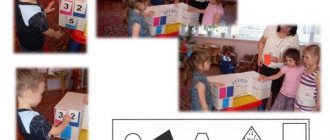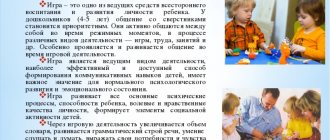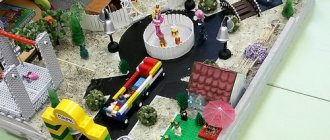MAGAZINE Preschooler.RF
“The role of the teacher in the development of role-playing games”Zaslavskaya T.Yu., teacher
Role-playing games are the most typical games for preschoolers and occupy a significant place in their lives. A distinctive feature of the plot-role-playing game is that it is created by the children themselves, and their gaming activity is of a pronounced amateur and creative nature. These games can be short-term or long-term. Managing this type of game requires great skill and pedagogical tact.
The teacher must guide the game without destroying it, and preserve the amateur, creative nature of children’s play activities. The teacher influences the play concept and its development, enriching the content of children’s lives: expanding their understanding of the work and life of adults, and the relationships between people. All these methods do not directly influence the game, but are aimed at a deeper disclosure of the sources from which children draw its content, at enriching their spiritual world. In expanding children's knowledge and understanding, it is necessary to observe moderation. The teacher should not rush, encouraging children to quickly reproduce in the game what they have learned during conversations, excursions, stories, etc. Reflection of the surrounding life in the game does not represent a direct reproduction of the learned content: it seems to persist in the mind for some time and children's feelings.
The role of the teacher in the game contributes to the development of its concept, expansion of content, clarification of game actions, roles, and the manifestation of friendly relations. The teacher must strive to ensure that these relationships are consolidated and become real relationships between the children and outside the game. The teacher exerts an educational influence through the roles performed by children. For example, he asks the child, who plays the role of the store manager, where the cash register is, who the cashier is, why there are no certain products in the store, who will wrap the purchases, prompts that the customers thank the seller, and the seller politely invites them to come to the store again.
In order for the game, having emerged, to move to a higher stage of development, it is necessary to organize it competently. The teacher must know the peculiarities of organizing play in a children's group. This requires great art, professional skill and love for children, based on knowledge of pedagogy and the psychology of play.
The management of role-playing games for preschool children assumes that the teacher influences the expansion of the themes of these games, enriches the content, and promotes children’s mastery of role-playing behavior.
In theory, there have been different approaches to guiding children's role-playing games. One of them is presented in the works of R. I. Zhukovskaya, D. V. Mendzheritskaya and includes the following components:
- enriching the content of games, creating interest in new stories
- enriching children's life experience, replenishing children's knowledge
- timely change of the gaming environment taking into account the enriching life and gaming experience
- activating communication between an adult and children during their play, aimed at encouraging and independent use by children of new ways of solving game problems, at reflecting new aspects of life in the game
- the ability to support initiative, the desire of children to organize a game on their own initiative.
The most effective way of leadership is the participation of the teacher himself in the game. Through the role he plays, he influences the development of the content of the game and helps to include all children, especially timid ones, in it. During the day, several games arise in the group: “Family” , “Kindergarten” , “Bus” , “Train” , “Car” and others. They seem to be connected to each other: by bus or car you can go to kindergarten, home, and to the theater. Children unite in small subgroups, sometimes everyone takes part in the game. The teacher plays with the children and gives them advice. The guys are active and willingly take on the roles of chauffeurs, drivers, and machinists.
The most favorite are games based on everyday stories. In “family” , the most educationally valuable thing is that they give children the opportunity to experience humane feelings for their parents, children and their peers. Children show keen interest in babies. But not all children have ideas about caring for a baby, do not reflect the actions taken to care for a small child, and do not show care for him. The role of the educator here is to enrich the game with content that has a positive impact on the child’s development. The teacher invites the players to watch the child, since his mother has gone to work. Willingly accepting the plot of the game, the children put the doll to bed, prepare food, and iron its clothes.
The teacher should systematically teach children to act with toys, take on the role of family members, and select the necessary materials. The teacher introduces children to the positive aspects of everyday life, taking into account that they learn intra-family relationships outside of kindergarten. To identify children's experiences, the teacher conducts conversations. He asks those who have little brothers and sisters to tell us how they are cared for. The poems by E. Blaginina “Alyonushka” , A. Barto “Mashenka” and other works serve as role models in games. The conversation gives impetus to the child’s imagination and helps to find various options for plots of the family game.
The theme of many games is the life of children in kindergarten. The role of the teacher should be to enrich children's knowledge and experience and develop interest in playing roles that reflect the work of kindergarten workers. Watching the game, the teacher advises how best to fulfill a particular role and plays with the newly introduced toys. When children play “kindergarten” with dolls, the teacher should suggest that during lessons the dolls can be read books and shown pictures. Thus, children's interest in books expands and curiosity develops. They acquire skills in educational activities: they learn to listen carefully to the teacher, follow his instructions, turn to him for help, and evaluate the results of their work.
Children of this age reflect the production activities of people in games of “transport” and “cars” . These games also require a role on the part of the teacher. Games with cars usually proceed as noisy fuss. The teacher, developing the game, tries to make the role of the driver, carrying cargo from one point to another, attractive. To this end, he recalls an excursion to a construction site, where children watched how cars carried construction materials and how they were unloaded. The teacher connects the impressions children receive from the excursion with their games with cars.
When forming a game as a children's activity, it must be saturated with content in accordance with the requirements of the program. A big role in the development of role-playing games belongs to the teacher.
| Next > |
The role of the teacher in the play process of children of primary preschool age
The success of any person depends on how he knows how to perform certain social roles. Already at a very early age, when entering society, a child is forced to fulfill these roles. Play as the main activity of a preschool child helps him to master various social roles: the role of a partner, initiator, etc. An important task of the teacher is to teach the child this, since he will then have to master more complex roles. This article is devoted to this problem.
Key words: game, society, children of primary preschool age, teacher, team.
Play, being an important part of a child’s life, is a reflection of the life of the society in which an individual child lives.
A gaming group is a social “organism” with its own relationships: cooperation, subordination, mutual control. The teacher, being the immediate leader of children's games, develops in them certain skills for living in a team: the ability to play together on the basis of mutual understanding, to help each other.
Initially, all children have equal rights to roles in the game, but at the same time, at any moment, each of them can come up with and offer something of their own, propose their own development of the game, and also resolve controversial issues.
Thus, the first traditions, their own “public opinion” are already beginning to emerge in the team, which will further determine the actions of children, regulate the relationships between them, and serve as a “measure” for assessing their own behavior, as well as the behavior of others.
Already at a very early age, children develop a need for communication. From the first months of life, a child, with his smile, various sounds he makes, and movements of his hands, expresses the joy of communicating with adults, who in their time are his first partners. At the same time, adults teach the child to recognize the world around him, to distinguish its sounds, smells, colors, etc. And already at a very early age, selective play actions can be observed in children. One will happily rattle rattles with images of birds and animals, while the other will choose simple spoons for himself and will also be happy making sounds from them. And from the moment the baby begins to crawl and sit, his play capabilities expand. He develops an interest in objects that develop his movements.
Adults, guiding children’s games, help them develop the plot of the game and be able to complete game actions. The teacher's sincere interest in the game, an affectionate tone, and a caring attitude towards the child and the image created in the game cultivate sensitivity and responsiveness in children.
In joint play with an adult, the child learns to invent a game, perform the necessary game actions, use not only the toys themselves, but also their substitutes, and learn to complete the game. It is important that children enjoy the game and bring them joy. If the child already knows how to play alone for a relatively long time (5–10 minutes), the teacher can direct his attention to a peer playing nearby, trying to arouse interest in his play.
At first, the baby becomes interested in the toy in the hands of a neighbor and will certainly want to get it. At this moment, contradictions may arise between children, which the teacher has the right and must resolve. Knowing the individual characteristics of each child, the teacher should try to engage them in joint play activities with one toy, or switch attention to playing with other objects. Sometimes it is advisable to develop the activity of one child and somewhat slow down the actions of another.
By playing certain roles, the child imitates not only the actions of an adult, but also his attitude towards toys and other participants in the game. The teacher’s passion for the role in the game and his sincerity contribute to the manifestation of the child’s own feelings. Children, due to a lack of knowledge, skills and abilities, have an unstable interest in the game. In this case, the role of the teacher is to support children’s interest in a certain role, give children the necessary knowledge to develop the plot of the game, as well as teach them certain skills and prompt them to perform the necessary actions.
The involvement of children in joint games should take place gradually with great caution, and in no case should it interfere with the desire of the child himself. Sociable children will be the very first participants in the games. And children who are more withdrawn will initially become only observers. And this should not be assessed in any way by the teacher. Otherwise, the latter may lose interest in group games for a long time, and then the child’s stay in kindergarten will turn into only a test.
It is important to take into account the characteristics of children of primary preschool age and organize games in small groups. In such games, the child can more clearly express himself as a partner in the game, which in the future will serve as the basis for mutual understanding and trust in his peers. A child who knows how to independently invent and develop a plot can easily be interested in the play of another.
Compliance with behavioral norms also depends on the child’s internal motivation, on what feelings he experiences and what feelings his partners in the game experience towards him. In a small play group, where the basis is mostly personal sympathy, it is easier for children to build friendly relationships and observe the norms of collective behavior.
For the development of collective creativity and the ability to analyze one’s actions, the skill of summing up a game is important. A technique such as talking with children at the end of the game can come to the rescue. Such conversations contribute to the development of thinking not only independently, but also with a perspective for the future. During the conversation, the teacher teaches children to evaluate their actions with dignity, analyze the actions of other characters in the game, and reflect on why the game ended this way and what can be changed next time.
Children gradually accumulate certain knowledge about the things and phenomena around them, about household items, and about the work of adults. They are interested not only in the actions of the people around them, but also in their experiences, concerns, and relationships. The accumulated knowledge allows us to expand the themes of games, and role-playing games appear. However, at this age, children’s interest in the plot is still unstable, and they easily move from one game to another. Consequently, in early preschool age, children can play joint games only if the organizing and guiding role of the adult is preserved.
Literature:
- Vygotsky L. S. Play and its role in the mental development of a child / L. S. Vygotsky // Questions of psychology. - 1966. - No. 06. - P. 62–68.
- Zaporozhets A.V. Game and child development / A.V. Zaporozhets // Preschool education. - 1964. - No. 4.
- Novoselova S. L., Zvorygina E. V. Play and comprehensive education of children / S. L. Novoselova, E. V. Zvorygina // Preschool education. - 1983. - No. 10 p. 38–46.
- Federal State Educational Standard of Preschool Education: first results: [Text]: materials of the interregional scientific and practical conference / ed. general ed. E. V. Kotochigova - Yaroslavl: GOU YaO IRO, 2015. - 72 p.
The role of the teacher in the development of children's role-playing games
Role-playing games are the most typical games for preschoolers and occupy a significant place in their lives. A distinctive feature of the plot-role-playing game is that it is created by the children themselves, and their gaming activity is of a pronounced amateur and creative nature. These games can be short-term or long-term. Managing this type of game requires great skill and pedagogical tact. The teacher must guide the game without destroying it, and preserve the amateur, creative nature of children’s play activities. The teacher influences the play concept and its development, enriching the content of children’s lives: expanding their understanding of the work and life of adults, and the relationships between people. All these methods do not directly influence the game, but are aimed at a deeper disclosure of the sources from which children draw its content, at enriching their spiritual world. However, in expanding the knowledge and understanding of children, it is necessary to observe moderation. The teacher should not rush, encouraging children to quickly reproduce in the game what they have learned during conversations, excursions, stories, etc. Reflection of the surrounding life in the game does not represent a direct reproduction of the learned content: it seems to persist in the mind for some time and children's feelings.
The role of the teacher in the game contributes to the development of its concept, expansion of content, clarification of game actions, roles, and the manifestation of friendly relations. The teacher must strive to ensure that these relationships are consolidated and become real relationships between the children and outside the game. The teacher exerts an educational influence through the roles performed by children. For example, he asks the child, who plays the role of the store manager, where the cash register is, who the cashier is, why there are no certain products in the store, who will wrap the purchases, prompts that the customers thank the seller, and the seller politely invites them to come to the store again.
In order for the game, having emerged, to move to a higher stage of development, it is necessary to organize it competently. The teacher must know the peculiarities of organizing play in a children's group. This requires great art, professional skill and love for children, based on knowledge of pedagogy and the psychology of play.
The management of role-playing games for preschool children assumes that the teacher influences the expansion of the themes of these games, enriches the content, and promotes children’s mastery of role-playing behavior.
In theory, there have been different approaches to guiding children's role-playing games. One of them is presented in the works of R. I. Zhukovskaya, D. V. Mendzheritskaya and includes the following components:
- enriching the content of games, creating interest in new stories;
- enriching children's life experience, replenishing children's knowledge;
- timely changes in the gaming environment taking into account the enriching life and gaming experience;
- activating communication between an adult and children during their play, aimed at encouraging and independent application by children of new ways of solving game problems, at reflecting new aspects of life in the game.
- the ability to support initiative, the desire of children to organize a game on their own initiative.
The most effective way of leadership is the participation of the teacher himself in the game. Through the role he plays, he influences the development of the content of the game and helps to include all children, especially timid ones, in it. During the day, several games arise in the group: “Family”, “Kindergarten”, “Bus”, “Train”, “Car” and others. They seem to be connected to each other: by bus or car you can go to kindergarten, home, and to the theater. Children unite in small subgroups, sometimes everyone takes part in the game. The teacher plays with the children and gives them advice. The guys are active and willingly take on the roles of chauffeurs, drivers, and machinists.
Perhaps the most favorite are games based on everyday stories. In “family” games, the most educationally valuable thing is that they give children the opportunity to experience humane feelings for their parents, children and their peers. Children show keen interest in babies. But not all children have ideas about caring for a baby, do not reflect the actions taken to care for a small child, and do not show care for him. The role of the educator here is to enrich the game with content that has a positive impact on the child’s development. The teacher invites the players to watch the child, since his mother has gone to work. Willingly accepting the plot of the game, the children put the doll to bed, prepare food, and iron its clothes.
The teacher should systematically teach children to act with toys, take on the role of family members, and select the necessary materials. The teacher introduces children to the positive aspects of everyday life, taking into account that they learn intra-family relationships outside of kindergarten. To identify children's experiences, the teacher conducts conversations. He asks those who have little brothers and sisters to tell us how they are cared for. The poems by E. Blaginina “Alyonushka”, A. Barto “Mashenka” and other works serve as role models in games. The conversation gives impetus to the child’s imagination and helps to find various options for plots of the family game.
In order for everyday play to primarily influence the development of children’s sense of humanism, responsibility, and friendliness, the teacher must model and introduce into it the educationally necessary aspects.
The theme of many games is the life of children in kindergarten. The role of the teacher should be to enrich children's knowledge and experience and develop interest in playing roles that reflect the work of kindergarten workers. Watching the game, the teacher advises how best to fulfill a particular role and plays with the newly introduced toys. When children play “kindergarten” with dolls, the teacher should suggest that during lessons the dolls can be read books and shown pictures. Thus, children's interest in books expands and curiosity develops. They acquire skills in educational activities: they learn to listen carefully to the teacher, follow his instructions, turn to him for help, and evaluate the results of their work.
Children of this age reflect the production activities of people in games of “transport” and “cars”. These games also require a role on the part of the teacher. Games with cars usually proceed as noisy fuss. The teacher, developing the game, tries to make the role of a driver attractive, carrying cargo from one point to another. To this end, he recalls an excursion to a construction site, where children watched how cars carried construction materials and how they were unloaded. The teacher connects the impressions the children receive from the excursion with their games with cars.
When forming a game as a children's activity, it must be saturated with content in accordance with the requirements of the program. A big role in the development of role-playing games belongs to the teacher.





